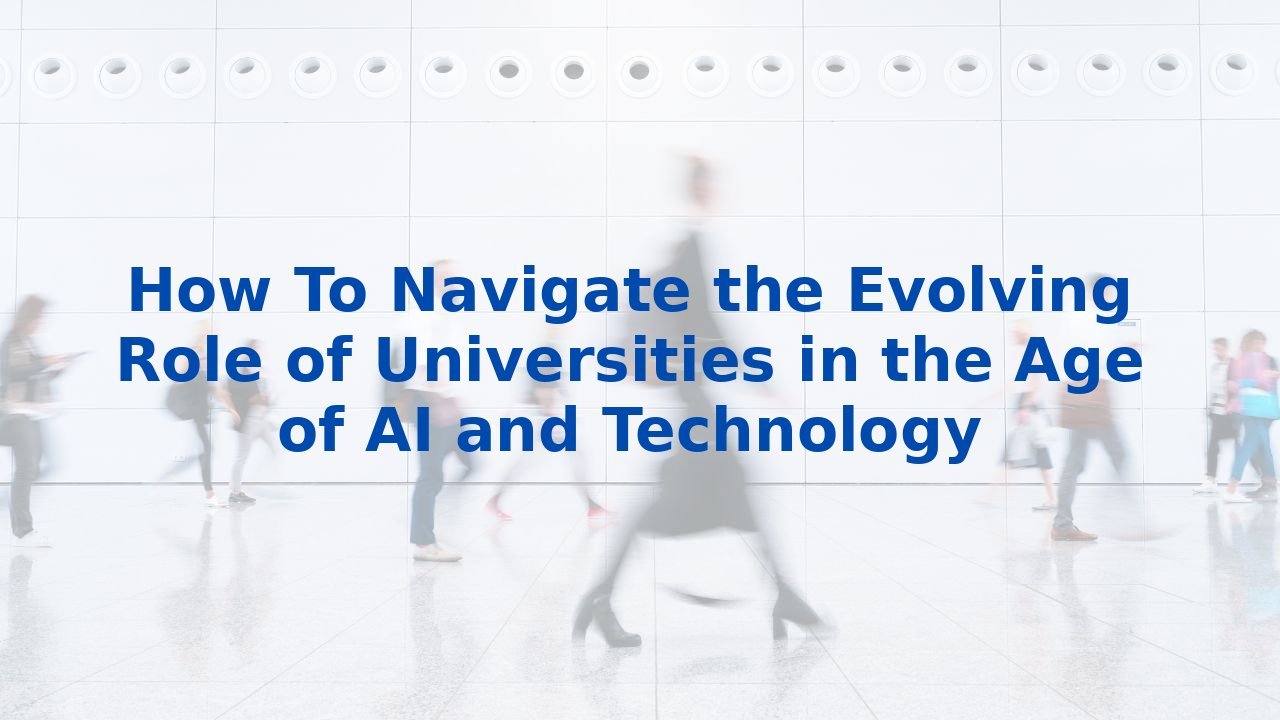How To Navigate the Evolving Role of Universities in the Age of AI and Technology
How To Navigate the Evolving Role of Universities in the Age of AI and Technology
As we stand on the brink of a technological revolution, the role of universities is undergoing significant transformation. The rise of Artificial Intelligence (AI) and technological advancements presents both challenges and opportunities for educational institutions. It's essential to explore how these changes shape the learning landscape, influence student experiences, and redefine organizational strategies within universities.
The Changing Educational Landscape
In a world where information is just a click away, the traditional model of higher education is continuously evolving. Universities must adapt to the demands of a new generation of learners who seek more than just theoretical knowledge. They need practical skills that are relevant in today's job market. The incorporation of AI in educational processes is crucial in providing the personalized, engaging learning environment that students crave.
1. Automation of Administrative Processes
AI can revolutionize how universities manage their administrative operations. Routine tasks such as scheduling, resource allocation, and student inquiries can be automated, resulting in time and cost savings. By streamlining these processes, universities can focus more on delivering quality education and fostering student engagement. AI systems can handle routine inquiries, allowing faculty and staff to concentrate on what truly matters—student development and academic progress.
2. Enhanced Learning Experiences
Imagine a classroom where the curriculum is tailored to each student’s learning style and pace. AI can analyze student data to provide a customized educational experience. Intelligent tutoring systems can identify areas where students struggle and offer tailored resources to enhance understanding. This level of personalization transforms the learning journey, making it more effective and enjoyable.
3. Data-Driven Decision Making
The ability of AI to analyze vast amounts of educational data is pivotal for university leadership. By employing advanced algorithms, institutions can gain valuable insights into student performance, institutional effectiveness, and curriculum development. This data-driven approach supports informed decision-making that ultimately enhances the university's educational strategies and resource allocation.
4. Preparing Students for the Future Workforce
Universities must prepare students for a labor market that increasingly demands AI competence. By incorporating AI-centric courses and training programs into their curricula, institutions can equip students with the skills they need to succeed in technology-driven industries. Emphasizing a curriculum that combines technical knowledge with critical thinking is essential in cultivating a new generation of innovators and leaders.
5. Fostering Innovation and Research
AI also paves the way for groundbreaking research initiatives within universities. With AI-powered tools, researchers can analyze complex data sets more efficiently, leading to faster breakthroughs across disciplines. From healthcare to environmental studies, the insights generated through AI can lead to significant advancements that address pressing global challenges.
The Importance of Training for AI Integration
The integration of AI into university operations and curricula comes with the pressing need to train faculty and staff. Understanding AI tools and their applications in the educational environment is vital. Here are some key benefits of investing in training:
- Empowerment: Faculty and staff trained in AI technologies can leverage these tools to enhance teaching methods and operational strategies.
- Collaboration: Training enables effective collaboration with AI systems, fostering an environment where staff can work alongside technology to optimize processes.
- Adaptability: Continuous education in AI helps faculty adapt to the fast-paced technological landscape, ensuring they remain relevant in their fields.
- Informed Decision-Making: Training develops skills in data interpretation, empowering educational leaders to make more nuanced decisions based on real-time insights.
Conclusion: Embracing the Future of Education
The role of universities is evolving in tandem with advancements in AI and technology. By embracing these changes, institutions can enhance efficiency, improve student experiences, and foster a culture of innovation. As we look to the future, it's clear that training faculty and staff for AI integration is not just an option—it's a necessity. To thrive in this digital age, universities must equip their communities with the tools to navigate these transformative challenges successfully. Education is not just about imparting knowledge; it's about preparing individuals for an unknown future. Let’s seize this moment to redefine education and empower the leaders of tomorrow.
“The future belongs to those who believe in the beauty of their dreams.” - A reminder that with the right tools and training, we can turn dreams into reality.



